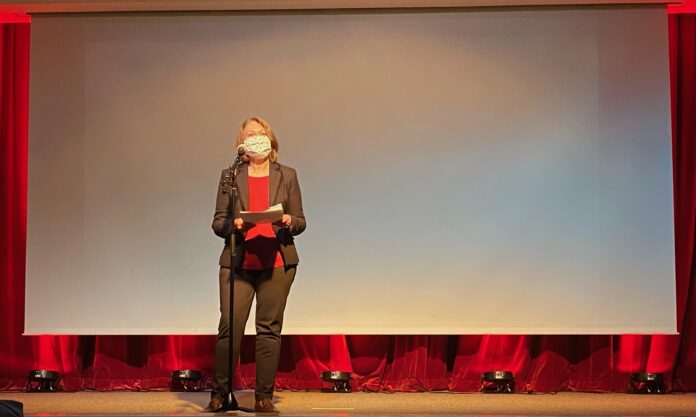On Oct. 22, Muhlenberg’s third annual Failure Fest was held in Seegers Union and live-streamed to remote students. The goal was for the speakers to share their experiences with failure as a way to celebrate risk-taking and resilience. President Kathleen Harring was the keynote speaker and was accompanied by Richard Niesenbaum, Ph.D., director of sustainability studies, Gregory Collins, Ph.D., assistant professor of business, Chris Jackson, Ph.D., director of choral and vocal studies, James VanValen, lecturer of theatre, and Brian Mello, Ph.D., associate professor of political science. The event was organized by Muhlenberg’s INE, S.O.L.E. and BYOB (The Entrepreneurship Club). Social distancing protocols were followed.
The evening began with Rita Chesterson, director of innovation and entrepreneurship, explaining the emergence of this event. It was started by the Be Your Own Boss club after learning of a similar function in Mexico City. She then introduced Niesenbaum as the first speaker.
Niesenbaum began with a promising project that he developed. He designed a recirculating system that could produce healthy fish and vegetables. He expressed, “My kids thought I was going to make millions.”
“Failure has likely been the single greatest force in my life.”
He established a greenhouse system, worked with students to develop a business plan and had interest from investors; however, he realized that his proposal had failed to be implemented. Niesenbaum took an important lesson out of it and advised students that “ideas are cheap and implementation is the challenge.”
Jackson headed to the platform with an important message, saying “Failure has likely been the single greatest force in my life.”
He then explained his downfall in 7th grade English. He was the perfect student and worked hard for A’s. Jackson’s grade in this specific course, however, didn’t reflect the energy that he was putting in. He soon concluded that his teacher didn’t like him. From that point, he let his grades plummet which continued throughout high school. It was a shock that he got into college, but that’s where his attitude changed.
He discovered that “failure is different than not trying,” which allowed him to push himself in college and gave him the opportunity to flourish. He encouraged folks to embrace failure and to enter spaces where they could fail safely.
VanValen shared a touching experience with failure. He had lived in Iowa for ten years with a stable job and happy life when a college in Florida, near where his family members lived, reached out to him with a teaching position. Feeling that it was the best move for his family and career he went, but got fired after six months. He expressed, “I was ashamed and didn’t know how I was going to provide.”
With time and new experiences, he began to heal.
“The word failure still triggers me and it’s hard and scary at times,” VanValen explained. He is now on a better path and is grateful for the people who helped him rebuild.
“Life isn’t going to go the way you planned and use your relationships to help navigate your world.”
President Harring closed the evening with several recollections of her failures from her life and the great lessons she learned. One that she reminisced about was in graduate school. She was in charge of coding surveys and when finished, she put them into a cardboard box. Later that day she was unable to find them and presumed that it was mistakenly thrown out. Harring’s friends hoisted her into the dumpster to look for them, but they couldn’t be found. She persevered and called the local garbage truck company to track it down. Harring admitted, “I went looking for my surveys at the dump.” The surveys weren’t there either and she knew it was time to accept it. Nervous to lose her job, she confessed to losing the surveys, but was told she just had to redo them.
When dealing with failure Harring says, “you need to be resilient.”
Harring noted three important R’s to remember when facing failure in order to achieve it effectively: Relationships, Resilience, and Risks. There are going to be bumps and detours along the way but it is important to develop thick skin to get through them.
One of Harring’s final points made was, “Life isn’t going to go the way you planned and use your relationships to help navigate your world.”
Each faculty member described vulnerable times in their lives which allowed students to see them from a different perspective and understand they had encountered more than just success. Miriam Roeder ‘24 attended and said, “The lessons were interesting because they humanized the faculty, and as a new student, I liked that.”
The objective of the night was to demonstrate to students that failure is a part of the journey.






















